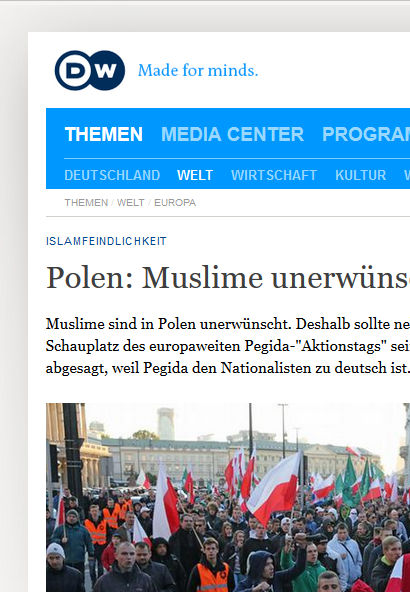As Poland celebrates 1,050 years of Christianity in Poland, the country’s right-wing government is pushing the country’s European heritage as the EU steps up its criticism, writes Deutsche Welle (DW), Germany’s international media platform. The news article seems to reflect the general angle of the German press on Polish current affairs quite well, although milder than some German-language reports, even at DW itself, where a headline in February read Polen: Muslime unerwünscht (“Muslims unwelcome”, a choice of words that triggers memories of “Jews unwelcome”, a notice on many German doors, especially once the Nazis had come to power. Dirty German history at Poland’s expense, in only two words.

DW: How ugly of you, Poland
Not all is well between Brussels and Warsaw, as an article by DW correspondent Barbara Wesel reflected in December, after the Polish government’s attack on the country’s supreme court, and its state media:
Polen is the biggest net recipient of EU funding in all of Europe. And Warsaw is wrong if only sees the European capital as the main cashier’s window. From there, obligations accrue, too. The number one obligation is to observe the rules of the club. If Jarosław Kaczyński believes he can impudently defy them, he needs to be disabused. Unfortunately, there are barely ways of imposing official financial sanctions, but maybe all sorts of mistakes can be found in future Polish project proposals… Rudeness like that of the Law-and-Justice party chief needs to be answered with rudeness.
Polen ist der größte Netto-Empfänger von EU-Fördermitteln in ganz Europa. Und Warschau irrt, wenn es in der europäischen Hauptstadt nur die Hauptkasse sieht. Daraus erwachsen auch Verpflichtungen. Erste Pflicht ist auf jeden Fall, die Regeln des Clubs einzuhalten. Wenn Jaroslaw Kaczynski glaubt, er könne sich frech darüber hinweg setzen, muss er eines Besseren belehrt werden. Leider gibt es in der EU kaum Möglichkeiten, offiziell finanzielle Sanktionen zu verhängen. Aber vielleicht finden sich ja allerhand Fehler in künftigen polnischen Projektanträgen… Auf einen so groben Klotz wie den polnischen PiS-Parteichef gehört ein grober Keil.
This kind of creative anger – probably indicative of the general mood among the political class in the City of Brussels – is a somewhat unpleasant sight, especially when Germans wield the financial club. Nothing is forgotten in Poland: no pressure, no words, which above all shouldn’t come from German mouths, will dissuade us, German news magazine Der Spiegel quoted Jarosław Kaczyński in January.
Kaczyński’s policies may be facing widespread opposition in Poland by now – but with comments like these, he may be able to reach some of his opponents, too.
Brussels and Berlin seem to understand that. While wide swathes of German press coverage is pulling Polish policies to pieces, German and EU diplomacy remain … well … diplomatic.
And the real dark clouds, from Warsaw’s point of view, are gathering in the West, from the direction of another complicated neighbor. That would be Russia. When it comes to the Katyn massacre, for years, “the blame for the killings was alternately attributed to the Germans and the Russians”, a Radio Poland continuity announcement informed the station’s listeners on Wednesday (7th minute), Poland’s official day of remembrance. The report that followed the announcement was more accurate, stating that the Soviet Union (the Soviet NKVD) had been responsible.
In the same broadcast, German journalist Boris Reitschuster is interviewed (20th minute) about his latest book (to be published on Friday, April 15) about Putin’s Secret Army. (Whatever may be said about the book (in terms of reliability or otherwise), conservative press people appear to be fans, while liberal and leftist publications don’t display nearly as much fascination.)
There was no official mention of the tragedy in Poland during the communist rule nor much was said in the West, which is also guilty of concealing evidence of the Stalinist crime,
Radio Poland said on Wednesday.
Maybe it’s this mood that defines the current mission of Polish remembrance policies: 500 monuments to the Soviet soldiers, who drove the German Wehrmacht out of Poland in 1944/1945, are scheduled to be demolished (CNBC) or removed (Newsweek).
It’s not the first action of this kind, but it is now reportedly the Polish state Institute for National Remembrance (INR) that calls on regional authorities to dismantle the monuments. It could become a comprehensive measure.
And at the same time, Polish media discuss the positive symbols that shall replace those from the communist era. A Radio Poland press review, still on April 13:
Back to Rzeczpospolita now which claims that President Lech Kaczyński, who was killed in the plane crash in Russia six years ago, deserves a dignified memorial in the Polish capital. Having in mind, however, deep divisions in Polish society surrounding the circumstances of the crash, it is not a good idea to erect such a memorial in front of the presidential palace, as is proposed by the Law and Justice Party. The Rzeczpospolita columnist thinks that hospitals, schools and libraries built from public funds and named after the late president would be a better way of remembering President Kaczyński, and of bridging the divides within Polish society.
The presidential palace in Warsaw may have to wait for its copy, but this what the presidential memorial might look like.
____________
Notes
→ 纪念“卡廷惨案”受害者的橡树, CRI, April 14, 2016
→ Instructions Importantes, CRI, April 12, 2016
→ Lech Kaczyński, 1949 – 2010, April 10, 2010
____________
[…] temporary, too, just as they are at Argentine Radio and TV, and disputes over journalistic content don’t appear to…